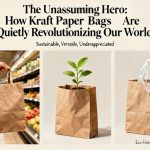
In an era where environmental consciousness has moved from niche concern to global imperative, the humble paper bag is experiencing a remarkable renaissance. Once overshadowed by the convenience of plastic, eco-friendly paper bags have emerged as both practical solution and powerful symbol in the fight against environmental degradation. These unassuming carriers represent more than just shopping accessories—they embody a fundamental shift in how businesses and consumers approach sustainability.
The environmental advantages of paper bags begin at their very origin. Unlike plastic bags derived from fossil fuels, paper bags come from trees—a renewable resource when managed responsibly. Modern paper bag production increasingly relies on sustainably managed forests where trees are continuously replanted, creating a cycle of regeneration rather than depletion. Furthermore, many manufacturers now incorporate recycled content into their paper bags, sometimes as high as 100%, dramatically reducing the demand for virgin materials and minimizing waste.
Perhaps the most compelling environmental benefit lies in the end-of-life scenario. While plastic bags may persist in landfills and oceans for centuries, paper bags typically biodegrade within weeks or months, returning to the earth without leaving harmful microplastics behind. Even when improperly discarded, paper bags pose significantly less threat to wildlife and ecosystems. Their compostable nature means they can complete the natural cycle, enriching soil rather than polluting it.
Beyond environmental considerations, paper bags offer surprising durability and versatility that many consumers underestimate. Modern manufacturing techniques have produced paper bags capable of carrying substantial weight while maintaining structural integrity. From reinforced bottoms to sturdy handles, today’s paper bags challenge the notion that sustainability requires compromising on functionality. Businesses across various industries—from high-end retail to grocery stores—are discovering that well-designed paper bags can enhance brand perception while fulfilling practical needs.
The business case for adopting paper bags has never been stronger. Consumers increasingly factor environmental considerations into purchasing decisions, with studies showing that sustainable packaging influences brand loyalty. Companies embracing paper bags often find themselves rewarded with positive publicity and customer appreciation. The bags themselves become mobile advertisements for corporate responsibility, carrying brand messages through streets and neighborhoods while demonstrating environmental commitment.
Innovation in paper bag design continues to accelerate, with manufacturers developing water-resistant coatings from natural materials, incorporating seeds for plantable bags, and creating aesthetically pleasing designs that consumers want to reuse. The concept of reuse represents another critical advantage—paper bags frequently serve multiple purposes in households, from storage organizers to craft project materials, extending their useful life before recycling or composting.
Transitioning to paper bags does raise legitimate questions about resource consumption, particularly regarding water and energy use in manufacturing. However, the industry has made significant strides in reducing these impacts through technological advancements, renewable energy adoption, and closed-loop water systems. When viewed through a complete lifecycle analysis that includes end-of-life impacts, paper bags consistently demonstrate superior environmental profiles compared to plastic alternatives.
As legislation increasingly targets single-use plastics worldwide, paper bags offer a readily available, scalable alternative that meets both regulatory requirements and consumer expectations. Cities and countries implementing plastic bag bans have witnessed successful transitions to paper alternatives without compromising commercial efficiency. This regulatory landscape, combined with growing consumer demand for sustainable options, positions paper bags as a pragmatic solution for businesses seeking to future-proof their operations.
The choice to embrace eco-friendly paper bags represents more than an environmental statement—it’s a commitment to a circular economy where materials are valued, reused, and returned to the earth without harm. Each paper bag chosen over plastic represents a small but significant step toward healing our planet. As this movement grows, the paper bag transforms from simple container to powerful agent of change, demonstrating that sustainable choices can be both practical and profound.
In our collective journey toward sustainability, eco-friendly paper bags serve as both practical tool and powerful reminder that sometimes the most effective solutions are those that work in harmony with nature’s wisdom. By choosing paper over plastic, we participate in a global shift toward conscious consumption—one bag at a time, one purchase at a time, building a cleaner future through everyday decisions.



Leave a Message